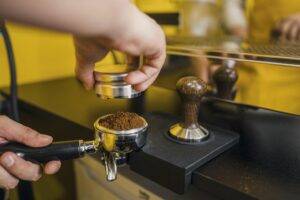
Aluminum Vs. Stainless Steel Moka Pot: Which One Is Better?
If you’re a coffee lover, then you’re probably familiar with the Moka Pot, the Italian coffee maker that’s been around for almost a century. The Moka Pot is a stovetop coffee maker that brews coffee by passing hot water through ground coffee beans, producing a rich and flavorful cup of coffee.
When it comes to choosing a Moka Pot, there are two popular materials to choose from: aluminum and stainless steel. Both have their pros and cons, and in this blog, we’ll explore which one is better.
Aluminum Moka Pot
Aluminum is the traditional material used for Moka Pots. It’s lightweight, heats up quickly, and is affordable, making it a popular choice for many coffee enthusiasts. However, there are some concerns about using aluminum for coffee makers, especially if you’re a health-conscious person.
Pros:
Lightweight – Aluminum is much lighter than stainless steel, making it easier to handle and maneuver.
Affordable – Aluminum Moka Pots are generally more affordable than stainless steel models, making them accessible to more people.
Quick Heating – Aluminum heats up quickly, so you can have your coffee ready in no time.
Cons:
Reactive – Aluminum is a reactive metal, which means it can react with acidic liquids like coffee and leach into the brew. This can affect the taste of the coffee and potentially be harmful to your health.
Prone to Scratching – Aluminum is more prone to scratching than stainless steel, which can affect the appearance of your Moka Pot over time.
Not Durable – Aluminum is not as durable as stainless steel and can dent or warp easily with regular use.
Stainless Steel Moka Pot
Stainless steel is a popular alternative to aluminum for Moka Pots. It’s durable, non-reactive, and has a modern, sleek look. However, it’s also more expensive than aluminum, which can be a deterrent for some buyers.
Pros:
Non-reactive – Stainless steel is non-reactive, which means it won’t react with the coffee and affect the taste. It’s also safe to use for people who are concerned about their health.
Durable – Stainless steel is much more durable than aluminum and can withstand regular use without denting or warping.
Easy to Clean – Stainless steel is easy to clean and doesn’t scratch easily, so your Moka Pot will stay looking new for longer.
Cons:
Heavy – Stainless steel is much heavier than aluminum, making it harder to handle and maneuver.
Expensive – Stainless steel Moka Pots are generally more expensive than aluminum models, which may be a deterrent for some buyers.
Slow Heating – Stainless steel takes longer to heat up than aluminum, so it may take longer to brew your coffee.
Which One is Better?
So, which one is better: aluminum or stainless steel? The answer depends on your personal preferences and priorities.
If you’re looking for an affordable and lightweight option that heats up quickly, then aluminum may be the way to go. However, if you’re concerned about the potential health risks of using aluminum or want a more durable and long-lasting option, then stainless steel may be the better choice.
It’s also worth noting that some people may prefer the taste of coffee brewed in an aluminum Moka Pot, while others may prefer the taste of coffee brewed in a stainless steel model. Ultimately, it comes down to personal preference.
Tips for Choosing a Moka Pot
A Moka pot is a classic and affordable tool for brewing coffee at home, but choosing the right one can be overwhelming with so many options on the market. Here are some tips to help you select a Moka pot that suits your needs:
Size: Consider the size of the Moka pot based on how many cups of coffee you want to make at a time. Moka pots come in different sizes, from one to twelve cups.
Material: Moka pots are typically made of aluminum or stainless steel. Aluminum is a better conductor of heat, but it may affect the taste of the coffee. Stainless steel is more durable and easy to clean, but it may take longer to heat up.
Brand: Choose a reputable brand that has been in the market for a long time. Some popular brands include Bialetti, Cuisinox, and Primula.
Design: Moka pots come in different shapes and designs, but the classic octagonal shape is the most common. Consider the handle design as well, as some handles may get hot during use.
Price: Moka pots are relatively affordable, but the price can vary depending on the size, material, and brand. Decide on a budget before making a purchase.
Maintenance: Look for a Moka pot that is easy to disassemble and clean. Some models are dishwasher safe, while others require hand washing.
Brewing experience: Finally, consider your brewing experience level. Some Moka pots may require more attention and technique to brew a good cup of coffee, while others are more forgiving. If you’re a beginner, consider starting with a simpler model.
By keeping these tips in mind, you can select a Moka pot that meets your needs and brews delicious coffee every time.
FAQs
Q: What is a Moka pot?
A: A Moka pot is a stovetop coffee maker that brews coffee by passing hot water pressurized by steam through ground coffee.
Q: What is the difference between aluminum and stainless steel Moka pots?
A: Aluminum Moka pots are made from a lightweight, soft metal that heats up quickly, whereas stainless steel Moka pots are made from a heavier, harder metal that heats up more slowly.
Q: Which is better: aluminum or stainless steel Moka pot?
A: Both types of Moka pots have their advantages and disadvantages. Aluminum Moka pots are typically less expensive and heat up quickly, but they can also corrode over time and may affect the taste of the coffee. Stainless steel Moka pots are more durable, don’t corrode, and don’t affect the taste of the coffee, but they are generally more expensive.
Q: Does aluminum affect the taste of coffee?
A: Some people believe that aluminum Moka pots can affect the taste of the coffee because the metal can react with the coffee acids. However, others argue that this is not a significant issue and that the taste difference is negligible.
Q: Are stainless steel Moka pots dishwashers safe?
A: While stainless steel Moka pots are generally considered to be dishwasher safe, it is recommended to check the manufacturer’s instructions before putting it in the dishwasher.
Some stainless steel Moka pots may have parts that are not dishwasher safe, such as silicone gaskets or plastic handles, which could become damaged or warped in high temperatures or harsh detergents in the dishwasher. Additionally, some dishwasher detergents can be abrasive and may cause scratches on the surface of the Moka pot.
To ensure the longevity of your stainless steel Moka pot, it is recommended to hand wash it with mild soap and warm water, and to avoid using abrasive sponges or cleaning products. If you do choose to use the dishwasher, it is recommended to place the Moka pot on the top rack and to use a gentle, non-abrasive detergent.
Q: Can I use a stainless steel Moka pot on an induction cooktop?
A: Yes, you can use a stainless steel Moka pot on an induction cooktop. Induction cooktops work by generating an electromagnetic field that heats the metal of the pot directly, rather than heating the air around it like a gas or electric stove. Stainless steel is a magnetic material, which makes it compatible with induction cooking. Just make sure that the bottom of your Moka pot is flat and smooth, so that it makes good contact with the cooktop.
Q: How do I clean my Moka pot?
A: To clean a Moka pot, disassemble it and wash each component with warm, soapy water. Rinse thoroughly and dry with a soft cloth. It’s also a good idea to descale the Moka pot periodically by boiling a mixture of water and vinegar in the bottom chamber.
Conclusion
In conclusion, the decision between aluminum and stainless steel moka pots ultimately depends on individual preferences and needs. Both materials have their unique advantages and disadvantages.
Aluminum moka pots are lightweight and affordable, making them a popular choice for those who value portability and budget-friendliness. However, they can be prone to oxidation and wear and tear over time, which may affect their durability and longevity.
On the other hand, stainless steel moka pots are more durable and resistant to oxidation and corrosion. They also offer better heat distribution and retention, resulting in a more consistent and flavorful brew. However, they tend to be heavier and more expensive than their aluminum counterparts.
In the end, the best choice between aluminum and stainless steel moka pots depends on individual preferences, such as budget, durability, portability, and taste preferences. Whether you prefer the affordability and lightweight of aluminum or the durability and flavor quality of stainless steel, there is a moka pot out there that can meet your needs.
You have already read:
Recent Posts
Affordable and Efficient: The Best Budget Coffee Makers of 2024
Finding the best coffee maker that doesn’t break the bank can feel like a challenging quest. But with 360CoffeeMaker, we’ve simplified your search for the best home coffee maker that suits your budget. For those who prefer to brew single servings at a time, the best single cup coffee maker of 2024 is undeniably the Keurig K-Mini. Compact, stylish, and efficient, it fits perfectly in any kitchen and caters to the needs of solo coffee drinkers or households where everyone has a different coffee preference.
If you're someone who enjoys a classic brew, the best drip coffee maker of 2024 is the Mr. Coffee 12-Cup Coffee Maker. Not only is it affordable, but it's also easy to use and consistently delivers a flavorful cup. But if you're searching for the absolute best coffee maker overall, look no further than the Black+Decker 5-Cup Coffeemaker. It's affordable, efficient, and provides the perfect balance between traditional brewing methods and modern convenience. Regardless of your choice, these budget-friendly options guarantee a quality brew without the hefty price tag.




